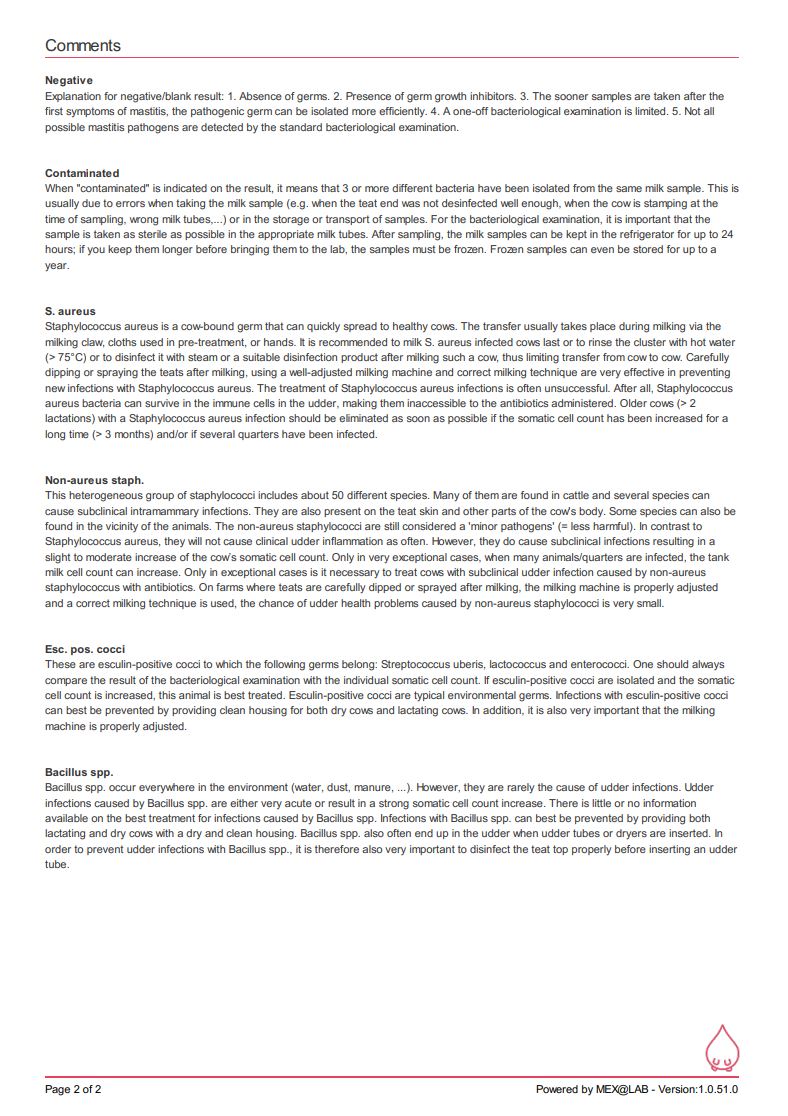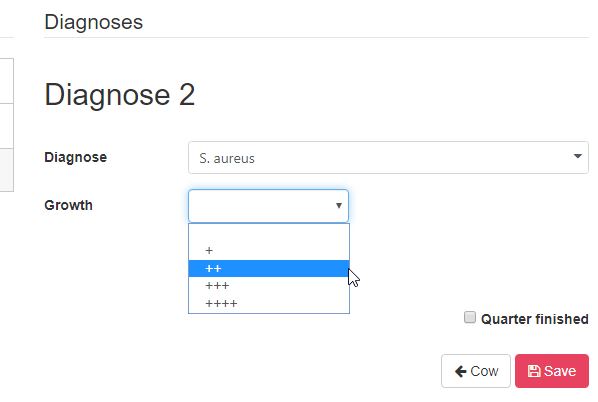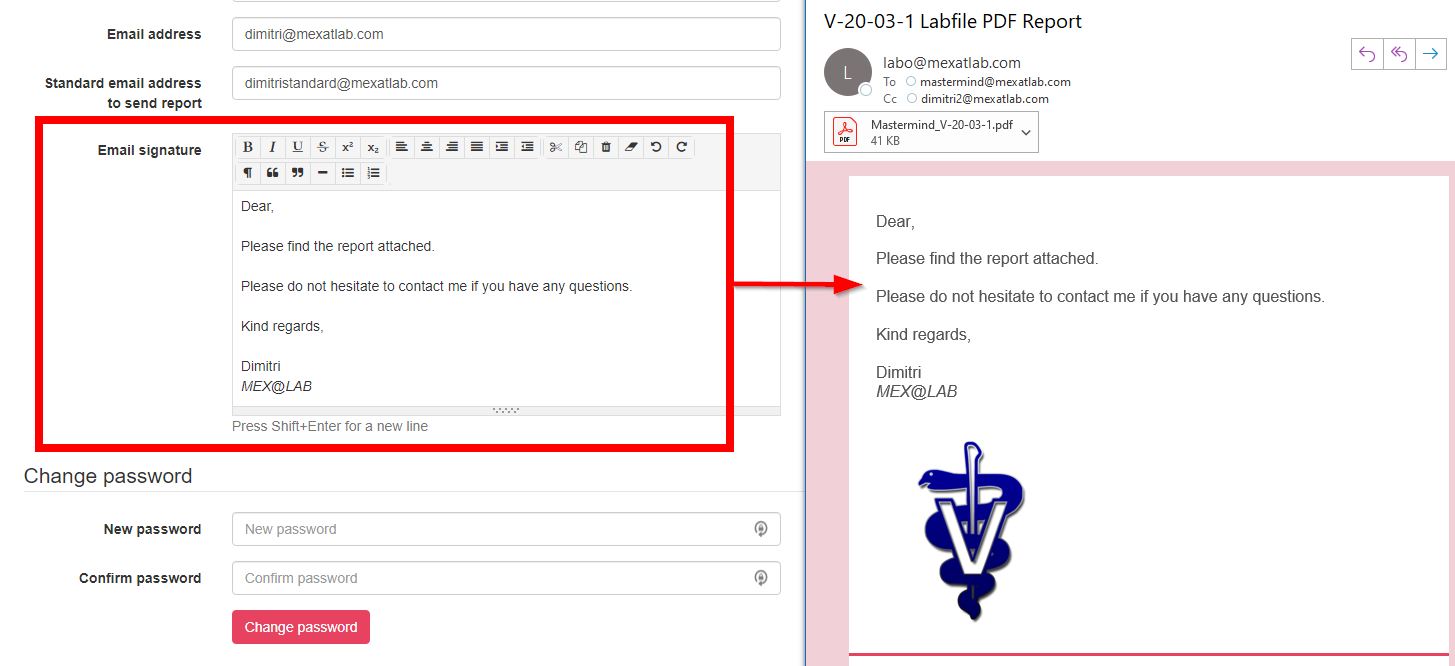MEX@LAB
The virtual lab-assistant for every vet practice that wants to get the maximum added value from conducting bacteriological culturing for his dairy producer and the vet practice
MEX@LAB
The virtual lab-assistant for every vet practice that wants to get the maximum added value from conducting bacteriological culturing for his dairy producer and the vet practice
MEX@LAB, the virtual lab assistant for every veterinary practice that wants to get maximum added value from conducting bacteriological culturing for his/her dairy producers.
Overview of the novelties
1. Analysis & overview of all results per dairy producer (Click here)
2. Standard information about the mastitis causing bacteria in each report (Click here)
3. Ability to visualize the strength of bacterial load (Click here)
4. Improved reporting towards your clients by e-mail (Click here)
Overview of all results per dairy producer... with 1 mouse click in a handy and clear report!
Select the period for which you want to make the analysis
Would you like to make an overview of all results twice a year for each of your dairy producers or would you rather have a quick overview of the available results for one specific dairy farm in respons to a mastitis problem? It's up to you! One mouse click and a few seconds later a clear, personalised and professional report will appear.
Overview of the evolution of the number of samples collected per month
The first graph in the report gives you more insight into the evolution of the number of milk samples per month obtained from cows with clinical or subclinical mastitis.
Knowledge of the origin of the mastitis causing pathogens
On the detailed graphs of the milk samples obtained from clinical and subclinical mastitis cases you can immediately see whether the mastitis causing pathogens are either more cow adapted or more environmental in nature.
Detailed overview of the farm-specific distribution of the mastitis causing pathogens
The results of individual bacteriological examination provide you with valuable information for your treatment advice for each specific cow. But which germ is most common on each farm? How can you best prevent new cases of mastitis in the future? Or maybe more than 5% of the milk samples were contaminated and therefore the real cause of the intramammary infection could not be identified? The detailed tables provide answers to all these questions at a glance.
Understanding the antibiotic resistance patterns
For each germ isolated you get an overview of the susceptibility tests that were performed and the percentage of germs that were (intermediate) sensitive or resistant to certain antimicrobials. This allows you to make targeted adjustments to the treatment strategy based on farm-specific results.
Overview table of all results per animal
With this detailed table combining all diagnoses from the selected period, you never lose the overview again. In this table, you will find the results of each animal from which a milk sample was collected in the selected period. And you will not lose sight of a specific animal that has been sampled multiple times.
Information about the mastitis causing bacteria in each report
All information about the mastitis causing pathogens that were isolated is available by default
You don't have to write your own texts anymore and type or copy the same explanations in every report over and over again. From now on a default text will appear in the report for each diagnosis. Useful information for the producer about the virulence of the pathogen, the prevalence of the pathogen and possible prevention measures are included in every report. This additional information can be found at the very end of the report. As a result, you can now use the entire advice field to formulate a clear and unambiguous (treatment) advice tailored to each specific cow.

Ability to visualize the strength of growth of each germ on the agar plate
Bacterial load
Via 4 categories (+, ++, +++, ++++), you can indicate the strength of the growth per pathogen found on the agar plate.

Improved reporting towards your dairy producer by e-mail
Use a default text in every email
In your personal settings, as in the example below, you can provide a default text that automatically appears in every email you send to your dairy producer. A greeting, reference to the report in the attachment, your personal signature and contact details, ... it's all possible.
The logo of your own vet practice in the email
In order to increase the recognisability of each e-mail towards your dairy producers, the logo of your own vet practice will automatically appear below the default text in each email. The only thing you need to do is to add the logo once into the system via your personal settings.
The name of each file contains the name of the producer
By not only incorporating the unique ID code but also the identity of the producer in the file name of each report you can immediately see at a glance for whom a particular report is intended without the need to open it. This is of course also useful if you save the files on your computer and want to retrieve them later.
The veterinarian assigned to a file automatically appears in CC
There is no need to manually add the email address of the assigned veterinarian to the emails. The veterinarian assigned to a file will automatically receive a copy of the email when it is sent to the producer.
Add a default recipient address
Do you already have a (common) email address to which all other lab results are sent? Fill in this email address in the field "Standard email address to send report" in your personal settings, and you will receive a copy of each result as soon as the report is sent to the producer.

MEX@LAB, your virtual assistant for conducting bacteriological culturing of milk samples in your vet practice - anytime, anywhere
Create added value on your udder health service


Maaltecenter Blok G
Derbystraat 297
9051 Gent - België
support@mexcellence.eu
+32 (0) 477 51 27 71
Driven by passion, inspired by science, and strengthened by experience, we make mastitis management easy

© Copyrights by Mexcellence BV.
All Rights Reseved/Alle Rechten Voorbehouden/
Tous Droits Réservés